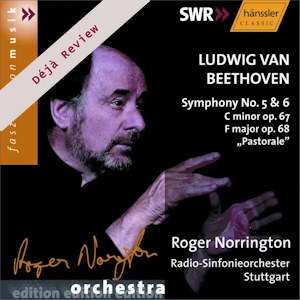
Déjà Review: this review was first published in June 2003 and the recording is still available.
Ludwig van Beethoven (1770-1827)
Symphony No. 5 in C minor, Op. 67 (1808) [33]
Symphony No. 6 in F, Op. 68, ‘Pastoral’ (1808) [41]
Stuttgart Radio Symphony Orchestra/Sir Roger Norrington
rec. live, 3 September 2002, Beethovensaal, Liederhalle, Stuttgart, Germany
Hänssler Classic CD93.086 [74]
Sir Roger Norrington’s recordings of the Beethoven symphonies with the London Classical Players certainly served as a wake-up call in critical circles and forced reappraisal of one’s long-held assumptions about this music. Hänssler are in the process of releasing another traversal spearheaded by this conductor, this time with the Stuttgart Radio Symphony Orchestra, with natural brass mixed with modern strings, and taken from live concerts in Stuttgart’s Beethovensaal. All credit should go to Hänssler’s engineers, for the recording quality is exemplary.
Norrington’s approach may take some getting used to. Take the very opening of the Fifth, probably the most famous opening of anything in all music. Norrington adds a swell to the second held minim, which momentarily disconcerts (Track 1). The whole approach to the first movement is fleet, scampering and often punchy. The problem is that it does not add up to a momentous statement; the music sounds, if not trivialised, certainly a trifle belittled. The interventionist feel encroaches into the Andante con moto, which is relentless and can be rather breathless (certainly the louder brass statements seem this way). The finale, however, is undeniably exciting (if course it includes the repeat) (Track 4), although ironically the adrenalin does not flow as freely as it might in the coda. When the ‘finishing line’ is reached, there is unfortunately no way that this performance gives the impression of having taken one on an heroic and epic journey.
Fast tempos and Roger Norrington go together like strawberries and cream, so it comes as no surprise to learn that the first movement is very brisk indeed (leading, again, to a rather superficial, rushed effect). One has to wait for the third movement for any real delight. Here all is jollity (TRACK 7), and there is some lovely, pointed oboe playing. The finale, however, does not afford much of a sense of relief, it sags in the middle and the result is that the ending sounds curiously incomplete. An immediate, and vociferous, call of ‘Bravo’ from a gentleman in the audience tells me not everyone will agree, however.
Norrington’s thoughts and reappraisals of the core repertoire always present plenty of fodder to chew on. Expect to be surprised, moved and, possibly, irritated.
Colin Clarke
Buying this recording via a link below generates revenue for MWI, which helps the site remain free



















